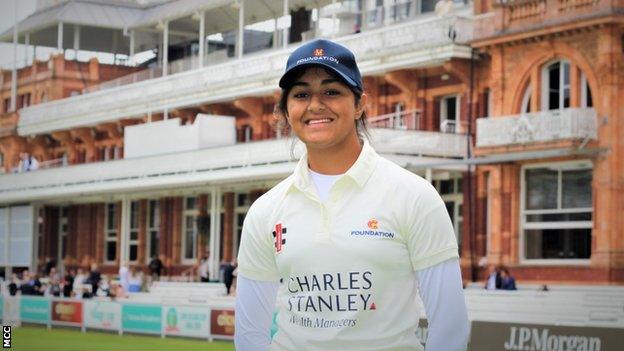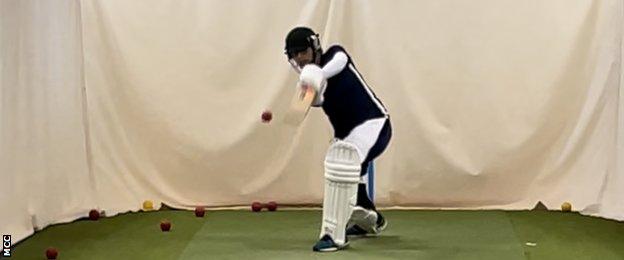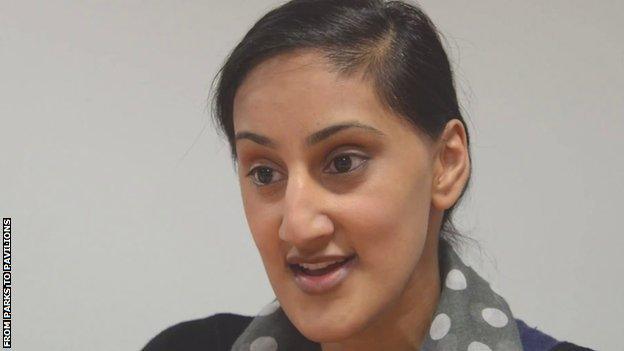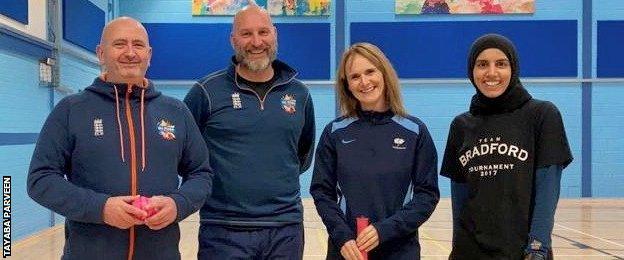Asian grassroots cricket: What does the future hold for Yorkshire's aspiring young female players?
- Published

Imaan Effendi has hopes of going on to play for England
When 14-year-old Imaan Effendi ran down the slope at Lord's it was not just her family that were looking on with pride.
The significance of seeing her and other girls from the south Asian community playing the game they love on such a grand stage fills everyone working in grassroots crickets in those communities with a huge wave of optimism.
And, in the wake of the racism scandal involving Azeem Rafiq at Yorkshire, a more optimistic picture surrounding the opportunities for Asian players at all levels, to learn, play and progress in the game has never been more needed.
"When the tannoy at Lord's said 'opening the bowling from the Pavilion End - Imaan Effendi' it was kind of surreal," Imaan's dad, Raza, told BBC England's Around the Wicket - Yorkshire's Asian Cricket podcast.
"What could be better than seeing your child playing at the most famous sporting arena in the world?"
It was occasion that inspired Imaan and the rest of her Bradford team-mates to victory over the Cotswolds, external in the final of the MCC National Foundation competition in September. For Imaan it was the fulfilment of a dream.
"It was an amazing experience to be in the players' dressing rooms and to have a tour of the whole place - just seeing it on TV and then to be able to play at such a world-renowned ground," she said.
"I want to have high aspirations for my cricketing future and play for England one day."
Cricket now a viable career choice

Imaan Effendi first started playing cricket with family
Having her dad watching on made the occasion all the more memorable for Imaan, who described the support her parents have provided in her pursuit of playing cricket as "inspirational".
"My dad's a massive cricket fan," Imaan said. "And when I went to my cousins' house, I always used to play in the garden and they always used to make my sister and I field while they used to bat and bowl.
"When we got a bit older, they used to encourage us to come and play and bowl and bat with them."
And having a daughter with a passion for playing cricket means everything to Raza, who was quick to point out a career as a cricketer is as valid a choice as studying to be a doctor or lawyer.
"Cricket was on in the background all the time and my daughters got really in to it," Raza said.
"In the summer holidays, even before breakfast, they'd watch it on the TV - they were just so fascinated in the game and that for me was a dream really as a parent.
"We've been all over the country. Imaan's played cricket at Lord's - one of the first girls to play there.
"The opportunities now are much wider for girls and Asian girls, and our children are fortunate in that respect. If Imaan pursues a career in cricket then all the best to her, we'll be fully supportive of her."
Sneaking off with your brothers' bats and balls
Imaan - and other girls like her - are the lucky ones. Many others from the same communities with the same love for cricket were not so fortunate in their pursuit of developing their ambitions.
Halima Khan is one of the few Asian women to coach cricket in England and her cricketing journey began as youngster in the 1990s.
"We'd take the milk bottles out of the crates and put one on top of the other and that would become our wickets," she said in an interview in 2016.
"My older brothers played cricket at club level and we used to sneak off with their bats and balls so from a very young age we got used to playing hard-ball cricket.
"It changed as I got older and the boys would come knocking on the door when I was 12, 13, that was when my parents would say 'no, she's not coming out to play'.
"I was quite restricted then in where I was allowed to go and play."

Halima Khan went into coaching after her opportunities of playing cricket were limited
As a result, Halima felt she was left with little choice but to become a coach instead. A coach who would try to make a difference.
"A lot of people said I had natural talent but when you get to a club you see the talent that is on the other side and what became very apparent to me was my lack of coaching at a young age," she said.
"I remember the realisation hitting that I'm never going to make it to the elite level because I've come into this too late."
It is not just coaches like Halima who have a burning desire to improve the pathways into cricket for girls. The West Yorkshire Women and Girls Softball League has been set up in Bradford in conjunction with the Yorkshire Cricket Board to help provide more opportunities for girls to play indoor cricket.
The effort is being made further afield too with the establishment of teams like the Be United Women's side - the first south Asian female cricket team in Lancashire.
Kay Baig, who started the team, says it has been - and still is - a challenge to provide the best possible set-up.
"We need more and more coaches to help the transition from soft-ball to hard-ball cricket," she said. "Finding those coaches is one of the obstacles we're facing.
"The pathways we're being given are clubs and some of these ladies are reluctant to join them because they're only beginners and the ladies at the clubs are trained and have been playing for years. It's a bit of a barrier. It's all about confidence."
'Lost trust' within the community

Tayaba Parveen (right) played a part in setting up the West Yorkshire Women and Girls Softball League with the Yorkshire Cricket Board
Former Bradford League player Ijaz Khan coaches men and women in Yorkshire and says previous pathways have been patchy and logistics have not helped.
"We tried to start a girls' team and the nearest they could play was 20-30 miles away in a predominately white affluent middle-class area," he said.
"It was a struggle to get there and you'd turn up and they were a little bit overawed. The facilities were an issue.
"There was like a false ceiling. When they got to a certain stage, there was no club for them to go to. There was either no pathway open to them or they weren't aware of any.
"We've taken girls to Headingley and some comments were made that they were alright and could play - some of the girls were better than some of the lads up there."
Further up the chain, Khan thinks similar pathway limitations are hurting the professional ambitions of Asian boys too: "Some will get there but I think there's still a bottleneck. Do they miss out on talent? I'm sure they do.
"There probably has been a lot of barriers. What happens going forward may help clear that bottleneck. I'm sure if you do the stats, they will get to a certain level like regional schoolboys but getting to the next level, I'm not too sure."
Khan and Baig are both encouraged by the number of trials available to young players with Yorkshire - but say their chances are being compromised by poor signposting of when they are happening and them not taking place in the local communities themselves.
"Yorkshire is a massive area and I'm sure there's some great people involved but these pathways need to have a better understanding of south Asian cricket and being connected to the grassroots," added Khan.
"They've got to rebuild their confidence. They've lost trust within the community. We've had prime examples of young players from Yorkshire not getting an opportunity at Yorkshire yet going on to play county cricket for other counties.
"That tells you as much as you need to know. Yes, Yorkshire has been a strong county and maybe that's been part of the issue."
Real action needed, not soundbites
The promise to remove any barriers in the talent pathways was one of the England and Wales Cricket Board's "12 tangible actions" in their five-point plan to tackle discrimination and racism in the sport, following a review into the Rafiq scandal.
Along with identifying talent from "non-traditional backgrounds" there is a pledge to reach a minimum 20% gender diversity as well as an "appropriate level of ethnic diversity".
While Khan is delighted to hear the plans for reform, he admits his optimism is slightly tempered.
"We've been here plenty of times before with people saying 'this is a revolution and a new chapter' and a lot of people jump up and down for a week or two, or month or two, and nothing happens," he said.
"Let's hope these are not soundbites or tokenistic gestures - that real change does happen.
"I would advocate the south Asian community stand up and be counted a little bit more and say 'right, you've told us you're going to treat us a bit more fairly - fantastic'."
Yorkshire County Cricket Club say they are determined to play their part in improving the prospects of young players, adding in a statement the club "acknowledges the need for progress and improvement in their approach to how talented young cricketers from all backgrounds are supported and encouraged within the sport".
The club said they have a commitment to maintain their historical work with a number of organisations "to build connections with south Asian communities" and highlight the introduction of a Community Town Champion to "improve the links between non-cricket affiliated environments and the existing talent pathway".
They add the county will work "proactively" with organisations across Yorkshire to "discuss and develop" how changes can be made to ensure the club "is a welcoming, inclusive and accessible home for all".
And it is that inclusivity pledge that Khan is hoping will be the lasting legacy, ensuring that if players come forward with any issues or problems they will be treated seriously.
"If they do see something that isn't what it should be, they need the confidence to speak out," he said.
"I can relate to that as I was one of the first players in the Bradford League and there was a lot of talk about how many south Asian players were playing and we paved the way.
"Now that barrier is not there to that extent and I like to think the same would happen with county cricket. If we have more people playing they'll think 'this is great we can do it too'."
Interviews conducted by Nasser Hanif. Archive interviews undertaken in 2016 as part of the 'From Parks to Pavilions' project by Bradford-based community organisation, the AYA Foundation.